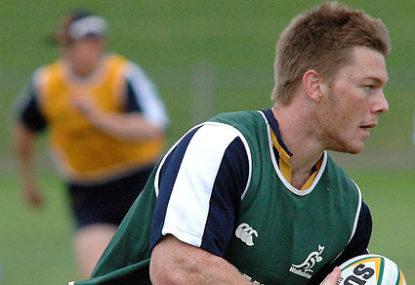Rugby Australia announce $9.2m deficit, board member fails to be re-elected but coup falls over
Six months after the Wallabies’ worst World Cup result, Rugby Australia has announced a $9.2 million deficit from the 2023 season. The Roar can…

You never quite know when you’ll get your big break. Or even when life might attempt to break you. Most rugby players and I suspect most people, imagine a sequence of events that leads to success.
Or at least leads to what they think success might looks like.
Interestingly, we almost never walk the path in life that we imagine. Instead, getting to where we hope to be is almost always a randomised maze of experiences and opportunities.
More than once rugby has captured this lesson for me.
The first occurred back in 1999.
As an eighteen year old, I was playing for my state in the annual Craven Week tournament. This state vs. state competition is somewhat like a compressed Currie Cup for juniors.
From Craven week, the National U18 team is selected.
In the first match against Transvaal, my teammates and I were completely outplayed. To make matters worse, the centre opposite me, named Jorrie Muller, had a blinder of a match.
I was more than disillusioned. I was shattered.
I remember wondering which university I would enrol in and which subjects I would choose.
Having spent most of my school years bored to tears, I made for a very poor student. The idea of asking my parents to fork over lage sums of their hard earned cash to subject me to additional years of mind-numbing frustration did not greatly appeal to me.
“Such is life,” I told myself.
Clearly, aspirations of professional rugby were a bridge too far for my meagre talents.
Three days later, I played the match of my life. I scored tries, set-up tries and made big hits.
In 80 minutes, I had played myself into the National U18 team. I signed a contract a week later with the Sharks and set off on my rugby journey.
University could wait.
Fast forward to 2004, minutes before the Wallabies were due to square off against England for the first time since the 2003 World Cup Final.
I had just finished warming up with the rest of the reserves and had begun running back to the change room when Eddie Jones tapped me on the shoulder: “Dell’s done his hammy, you’re starting mate.”
The change room was a blur of “good luck” and advice that I couldn’t hear, or at least could not absorb.
That is, until I sat down to organise my thoughts.
At that moment, big Dan Vickerman walked over and put both his hands on my shoulders. I looked up to catch Dan’s serious face (this in itself was not surprising given it is a face Dan has perfected and chooses to wear often).
Never one for flowery monologues, Dan put things in his uniquely Dan way.
“Clyde, this is a big opportunity. Whatever you do, don’t choke.”
I think I expected him to smile but instead he retained his serious look and marched off, presumably to impart pearls of wisdom on the rest of my teammates or to punch someone in the face.
80 minutes later, on the back of a master class from Joe Roff, I had been gifted three tries, cemented myself as a starting player with the Wallabies, and once more learnt that opportunity and misfortune hide around every corner.
Life is filled with such twists and turns that the idea of meticulously planned career paths and highly dependent, detailed and defined “step by step” goals seems rather silly to me.
That is not to say one should not have goals.
Of course we should.
And our goals should be terrifyingly epic and exciting. Our goals should reflect the best parts of our imagination, our passions and our morality.
And importantly, our goals should be set in the context of a quote put by Charles R. Swindoll, who said: “Life is 10% what happens to me and 90% how I react to it.”
To swing the discussion back to rugby, teams should forget setting goals that make impossible assumptions or predictions.
I remember a Brumbies pre-season planning session at the Australian Institute of Sport.
During a goal-setting session, the group went through our playing itinerary. How many points did we want to take from our tour of South Africa? What was a reasonable number of points to have secured by mid season?
What did we aim for in terms of our home record?
These questions bothered me at the time, but I could not define why.
In hindsight, I realise that each match must be treated as an individual. It is completely fruitless to adopt a different attitude.
As ‘crunch time’ nears for many Super Rugby teams, the greatest challenge is to retain a collective mindset and attitude that optimises their chance of success.
This might sound simple but it is probably the single most difficult quality a championship team must earn. A winning mindset is born out of consistency, and consistency demands great discipline and sacrifice.
Consistency of effective coaching, training and preparation produces a consistent mindset that leads to consistent performance. After all, teams are comprised of people and people are a product of their habits.
The pressure of imminent Super Rugby finals has intensified the race to the championship. We are all about to learn how well our favourite team handles this pressure.
It’s going to be fascinating viewing.
Former Wallaby Clyde Rathbone writes an exclusive weekly column for The Roar. Rathbone is a director of Health Futures, an Australian owned and accredited workplace health management specialist, delivering corporate health solutions Australia wide.